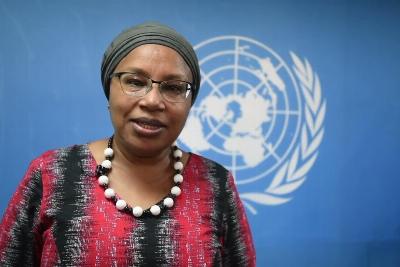"When histories of the war in the Gaza Strip are written—a war triggered by the Hamas pogrom in southern Israel on Oct. 7, 2023—the name of Alice Nderitu probably won’t garner more than a footnote at best. That’s an enormous shame because Nderitu’s courage in confronting the institutionalized obsession of the United Nations with the Palestinians takes us to the heart of the great issues wrapped up in this conflict—its purpose, the manner in which it has been fought and the manner in which it has been presented to the outside world.
The story of Nderitu’s ordeal as the U.N.’s Special Advisor for the Prevention of Genocide was the subject of an engaging piece by Johanna Berkman published last week by the online magazine Air Mail. Nderitu took over the unpaid position during the COVID-19 pandemic in 2020. She lasted for nearly four years in the post before U.N. Secretary-General António Guterres decided against renewing her commission last November following a sustained and often abusive campaign directed at Nderitu—a storied human-rights advocate from Kenya—for her refusal to label the fighting in Gaza as a ‘genocide.’
At the time, Guterres’s decision to effectively sever Nderitu was the subject of a scathing Wall Street Journal editorial that accused the international organization of a ‘new low’ in its efforts to tarnish Israel as the worst offender among its member states, which include such human-rights luminaries as Russia, China and North Korea. But by and large, the scandal passed unnoticed among the chattering classes, despite their tendency to dip their toes into the Israeli-Palestinian conflict with agonized appeals on behalf of the ‘people of Gaza’ from time to time. The same was true for the Air Mail piece profiling her; while the Free Press republished it, everyone else pretty much ignored it.
One key reason why was identified by Nderitu herself in her interview with Berkman. For nearly three of the four years of her U.N. tenure, she was incredibly busy but also mostly unnoticed. Her work took her to refugee camps in Bangladesh and Iraq, to the Brazilian interior to monitor the fates of indigenous tribes, and to Chad, where she saw firsthand the impact of the burgeoning ethnic slaughter that has raged, largely outside the media’s view, in neighboring Sudan. ‘For these other situations,’ she said, ‘nobody seems to bother with what I say.’
The core point that emerges from the profile of Nderitu is that she desperately wants to make these forgotten conflicts a central topic of discussion and action. Reading her comments, I felt a distinct mix of disgust and shame when she related being told by Sudanese refugees: ‘Right now, nobody is paying attention to our country. If there is ever peace and the cameras go in, you will face the most shocking thing of the century, a genocide that was completely ignored.’ That observation is unarguable.
But after the slaughter on Oct. 7, suddenly everyone wanted a piece of Alice Nderitu. They did so not to beseech her to call the Hamas atrocities, which she condemned, a ‘genocide,’ but to compel her to apply the ‘genocide’ determination to Israel, even before the Israel Defense Forces launched its campaign to destroy the Hamas rape squads in Gaza.
This is a good juncture to note that Nderitu is not an advocate of Israel’s side in this war. Nor is she, as far as I am aware, a supporter of Israel more generally. And that’s fine because as a consummate professional, she understands that her personal leanings are not relevant to her work as a genocide prevention expert. As she says, a genocide determination can only be made by a court of law, and no court—despite the efforts of South Africa; Ireland; Karim Khan, the prosecutor of the International Criminal Court in The Hague; and sundry others—has done so thus far.
But in the eyes of those for whom Gaza is all-consuming, Nderitu’s determination to stick to the correct procedure was an unmistakable sign of collusion with the hated ‘Zionist entity.’
‘Filthy zionist rat, you will burn in hell forever,’ read one of the more unhinged emails that arrived in her inbox. Her other detractors essentially said the same, albeit in politer language..."
February 7, 2025
A suppressed voice for truth from within the United Nations

Alice Nderitu (File photo/screenshot)
Date
February 7, 2025
Title
A suppressed voice for truth from within the United Nations, Jewish News Syndicate
Author(s)
Ben Cohen
